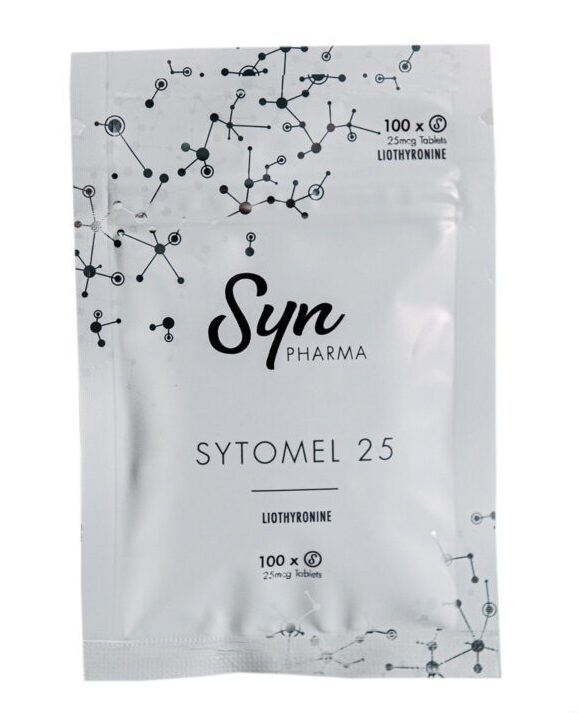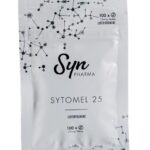No products in the cart.
Back 

In stock
T3/Cytomel, 100 Tablets
$90.00
SKU: 29045-SB-9-29-1-1-2
Categories: Fat Loss, Men’s Health
Cytomel/T3 is a synthetic hormone derivative and is responsible for metabolic activities in the body; controlling metabolism and setting the basal metabolic rate. This substance effectively controls how much fat the body burns. To sustain a basal energy metabolic rate and energy expenditure, Cytomel acts primarily on metabolism of ingested carbohydrates, lipids and proteins. Increased T3 level causes a stimulation of fat mobilization from the adipose tissues where they are stored. T3 also helps to oxidize fatty acids in body tissue as well as up-regulating cholesterol metabolism.
- Description
- Reviews (0)
Cytomel/T3
What is Cytomel/T3 and How does It Work?
Cytomel is a common trade name for the drug liothyronine sodium which is a synthetically manufactured form of a thyroid hormone known as triiodothyronine (T3). Thyroid hormone is produced by thyroid gland in the body. Hormones produced by the thyroid gland includes thyroxine (T3) which is an inactive prohormone and triiodothyronine (T3) which is produced in relatively lower quantity but is the more active of the two. The thyroxine hormone often has to go through a conversion process to T3 to become active. These hormones of the thyroid gland are needed in the regulation of the body’s metabolic rate. They are also useful in brain development, heart and digestive functions, bone development as well as mood regulation.
Typical symptoms of low thyroid hormone levels include dry skin, weight gain, slow heartbeat, constipation, fatigue, muscle pains, and sensitivity to cold.
Cytomel; the synthetic T3 salt is most commonly used to treat hypothyroidism and myxedema coma. It is useful in the treatment of patients with thyroid cancer and infertility due to low thyroid hormone levels. It is a very useful antidepressant; increasing and enhancing antidepressant activities when taken alongside tricyclic antidepressants especially in women with major depressive disorders. It is also useful in treating fibromyalgia; a disorder in which patients suffer from musculoskeletal pain, mood swings, memory issues, excess sleep and fatigue. Cytomel is as well useful in the treatment of goiter; a situation arising from enlarged thyroid gland.
CYTOMEL AND WEIGHT LOSS
As mentioned earlier, the thyroid hormones, one of which cytomel is a synthetic derivative is responsible for metabolic activities in the body; controlling metabolism and setting the basal metabolic rate which means that these hormones control how much fat the body burns. To sustain a basal energy metabolic rate and energy expenditure, cytomel acts primarily on metabolism of ingested carbohydrates, lipids and proteins. Increased T3 level causes stimulation of fat mobilization from the adipose tissues where they are stored, thereby raising the concentration of the free fatty acid in the plasma. T3 also helps to oxidize fatty acids in body tissue as well as cholesterol metabolism.
The concentration of cholesterol in the plasma is also reduced with increased levels of T3. This is done inducing the hepatic intake of cholesterol, converting it into bile acid which is excreted from the body as feces.
Although, the drug is more often used to treat hypothyroidism, a major effect of the drug is weight loss. With the intake of cytomel, T3 levels increases and consequently, the rate of metabolism in the body as well increases.
In a research study; the effect of triiodothyronine on weight loss and nitrogen balance of obese patients on a very-low-calorie liquid-formula diet (Wilson and Lambert, 1981), T3 was administered to 11 obese patients. The patients were put on a 320kcal diet and received a 25 microgram orally administered T3 every eight hours from the 20th day. It was found that mean daily weight loss increased significantly when they were supplemented with the T3 administration. The weight loss increased from an average of 269 grams per day to an average of 395 grams per day (a total weight loss of 132 grams daily on supplementation of diet with cytomel). It was also found that this this weight loss did not cause with a Nitrogen imbalance.
In a similar study, the effect of a low calorie diet alone and in combination with triiodothyronine therapy on weight loss and hypophyseal thyroid function in obesity (Koppesachaar et al., 1983), in the treatment of obese patients, they administered a daily T3 supplementation of 150 micrograms to a group. This group with the T3 supplementation had an increase in their T3 levels accompanied with a decrease in T4 levels and they had an increased and steady weight loss compared to the groups without this supplementation. They also did not record any symptoms of hyperthyroidism or resistance to the drug. Cytomel therefore is very useful for weight reduction especially when supplemented with a diet.
Apart from its use in treatment of obesity to increase weight loss, cytomel (T3) is also known to help with muscle formation. Cytomel stimulates the growth of the skeletal muscle. It does this by increasing the number and diameter of the muscle fibers in the body.
USAGE AND DOSAGE OF CYTOMEL
T3 is the more active thyroid hormone in the body and usually, it may be formed in the body by the enzymatic deiodination of the thyroxine (T4) hormone. While intake of the T3 salt in form of cytomel tablets causes an increase of T3 in the body, it consequently decreases the amount of T4. As it directly increases the rate of metabolism in the body, it may also cause higher body temperature and increased heart rate. These two variables (heart rate and temperature) need to be monitored when taking cytomel in order to prevent excessive dosing. Usually, the body temperature should not be more than 37 degrees centigrade and the resting heart pulsing rate should be no more than 70-80 beats per minute. These variable may also help in deciding the ideal cytomel dosage.
Cytomel dosage typical starts low and increases over a period of time. Cytomel tablets can be found in 3 form; the 5mcg, 25 mcg and 50 mcg forms. The recommended starting dosage for hypothyroidism and depressive patients is 25mcg daily which then increases by another 25 mcg daily after 2 weeks. Cytomel dosage can be as high as 70 to 100 mcg daily. However, other patients for example pediatrics and those looking to reduce weight and gain muscles are advised to start with a lower dose, a daily dose of 5-10mcg and then increase with an additional 5-10 mcg after every one or weeks.
For men who want to get the best out of the metabolic effect of cytomel, a dosage of about 25-50 mcg daily may be recommended which may increase to about 75-100 mcg as time goes on. However, because women generally have lower weights and body masses than men, they are advised to start with lower dosages and take no more than a dosage of 50 – 70 mcg daily even as time goes on.
SIDE EFFECTS OF CYTOMEL
Just like any drug, cytomel may have side effects. Although there may eventually be no side effects or reactions, some of these effects may include menstrual changes, dizziness, sweating, nausea and skin irritation. On very rare occasions, cytomel has been reported to cause temporary hair loss albeit in children taking it for and only for the first few weeks or months. In cases of overdosing, effects such as severe headaches, light headedness, nervousness, loss of consciousness, inability to speak or move arms or legs, heat sensitivity and insomnia may occur.
Cytomel Cycle
How and in what pattern you use this hormone is referred to as the cycle. If you are a first-time T3 Cytomel user, it is better to start with a small dose when you start the cycle. Afterward, you can gradually increase the quantities of T3 Cytomel you are taking. At the end of the cycle, you can go back to the lower doses. This helps the doctor and you understand how your body is responding to the hormone. However, it may not always be important and a doctor may just prescribe a higher dose.
Cytomel Overdose
It is important to always take the prescribed amount of Cytomel. Overdose can cause issues such as confusion, weakness, swelling in feet and hands, chest pain, faster heartbeat, fainting, restlessness, anxiety, sweating, diarrhea, headaches, and shortness of breath. Some women may experience irregular periods as well.
If you experience any of these symptoms or any severe side effects, seek emergency help urgently.
References
- Chaker, L., Bianco, A. C., Jonklaas, J., & Peeters, R. P. (2017). Hypothyroidism. Lancet (London, England), 390(10101), 1550–1562. https://doi.org/10.1016/S0140-6736(17)30703-1
- Danzi, S., & Klein, I. (2005). Potential uses of T3 in the treatment of human disease. Clinical cornerstone, 7 Suppl 2, S9–S15. https://doi.org/10.1016/s1098-3597(05)80052-3
- Jonklaas, J., & Burman, K. D. (2016). Daily Administration of Short-Acting Liothyronine Is Associated with Significant Triiodothyronine Excursions and Fails to Alter Thyroid-Responsive Parameters. Thyroid: official journal of the American Thyroid Association, 26(6), 770–778. https://doi.org/10.1089/thy.2015.0629
Be the first to review “T3/Cytomel, 100 Tablets” Cancel reply
Related products
- AOD-9604, 5mg, 3 Pack
$240.00Original price was: $240.00.$216.00Current price is: $216.00.




Reviews
There are no reviews yet.